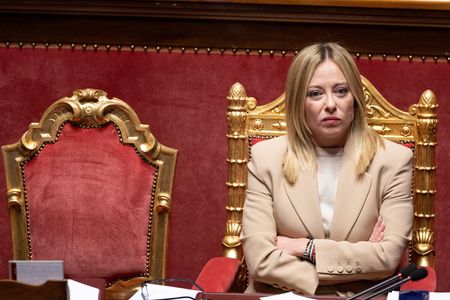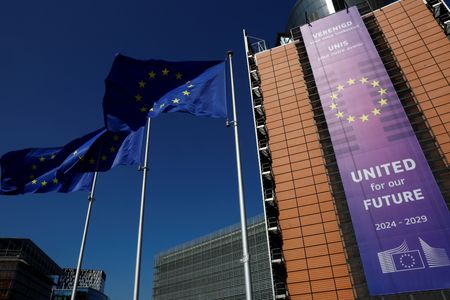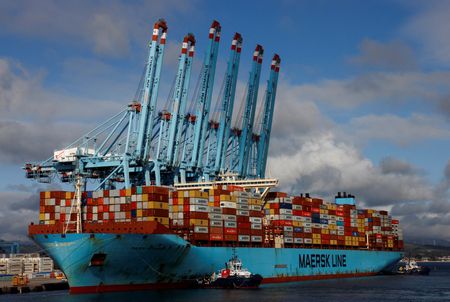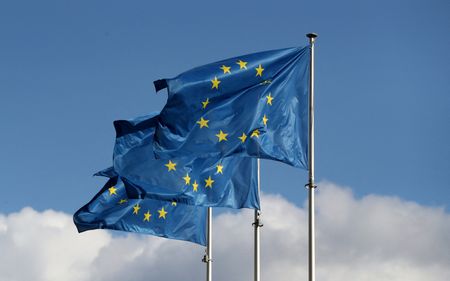By Marc Jones
LONDON (Reuters) -A planned 140 billion euro ($161 billion) loan for Ukraine from the EU backed by frozen Russian assets is unlikely to hurt sovereign ratings of EU countries, two leading credit rating agencies said.
Belgium, where the Russian funds now sit in the Brussels-based Euroclear settlement system, has particular concerns from the risk of Russian lawsuits, but even these are unlikely to affect its credit score as long as other EU members share the risk.
The EU is under pressure from Ukraine to press ahead with the so-called reparations loan next month to help fill Kyiv’s financing gaps. Efforts by the U.S. to broker peace between Russia and Ukraine are adding to calls on the EU to push forward with the loan.
The EU’s proposal, which has been in the works for well over a year, envisages frozen Russian assets being invested in a long-dated, zero-coupon European Commission debt instrument.
That in turn would finance a 140 billion euro loan to Ukraine, which Kyiv would have to repay only if Russia compensates it for war damages once the conflict ends.
Theoretically, EU countries could be on the hook for the full amount, but only if Russia claws back its money.
S&P’s top EMEA analyst, Frank Gill, said his firm expected “no meaningful effect” on EU governments’ ratings, because of the availability of the Russian funds.
“Because these guarantees are collateralised with liquid assets, we would not classify this as a significant fiscal risk,” Gill said.
Fitch’s head of Western Europe Sovereigns ratings, Federico Barriga-Salazar, said EU countries’ guarantees for the loans were likely to be treated as “contingent liabilities”, payable only under highly specific circumstances.
The risk would also “be very well spread” across the EU, Barriga-Salazar added, though he noted that the full cost would be high for Belgium in the unlikely event that it were forced to pay and other EU countries left it in the lurch.
“A full guarantee on the proposed 140 billion euro loan would be large for Belgium, at 22%-23% of GDP,” he said, “but small for the EU overall, at less than 1% of GDP.”
COMPLEXITIES
The EU’s loan plan has proved a complex endeavour primarily because Belgium, along with some other EU members and the European Central Bank, have raised concerns that the outright seizure of Russia’s reserves would break international norms and damage the euro’s reputation.
Additional uncertainty has come over the last week too after a 28-point peace plan put forward by the U.S. following talks with Russia proposed putting a large chunk of the immobilised Russian money into a U.S.-led reconstruction fund instead.
The EU, which estimates Ukraine’s funding needs at just over 135 billion euros over the next two years, is still pushing to agree on the reparations loan by December, with first disbursements expected in the first half of next year.
If the plan does go ahead, the money could provide Ukraine with funding security until at least 2028, Fitch estimates, by when a new EU budget draft foresees a doubling of the bloc’s main Ukraine support facility to 100 billion euros.
S&P’s Gill said that the impact of the additional liabilities would be offset by an assumption that aiding Ukraine reduces the amount EU countries need to spend on their own defence.
“It would be more likely to potentially replace the future need to divert public resources to national security,” Gill said, adding S&P also assumes the European Commission will provide financial guarantees to Belgium to share any Russian litigation costs.
BELGIAN CONCERNS
Moody’s declined to comment on the likely impact of the proposals.
The smaller EU-based Scope ratings agency also sees the plan as the less arduous option for European capitals. One of its top analysts, Dennis Shen, said this type of arrangement to fund Ukraine would weigh less on European nations’ finances than direct loans or grants.
Belgium’s Prime Minister Bart De Wever has raised concerns that as the frozen assets sit in Euroclear, his government would be on the hook to repay Russia’s billions if Moscow took legal action.
In the unlikely scenario where Belgium was clobbered for the full 140 billion euro liability, its A+ rating would “definitely be pressured” Fitch’s Barriga-Salazar said, potentially with a one-notch cut.
“Belgium is already a country that has relatively limited (fiscal) buffers,” Barriga-Salazar said.
($1 = 0.8678 euros)
(Reporting by Marc Jones; editing by Elisa Martinuzzi, Karin Strohecker and)










